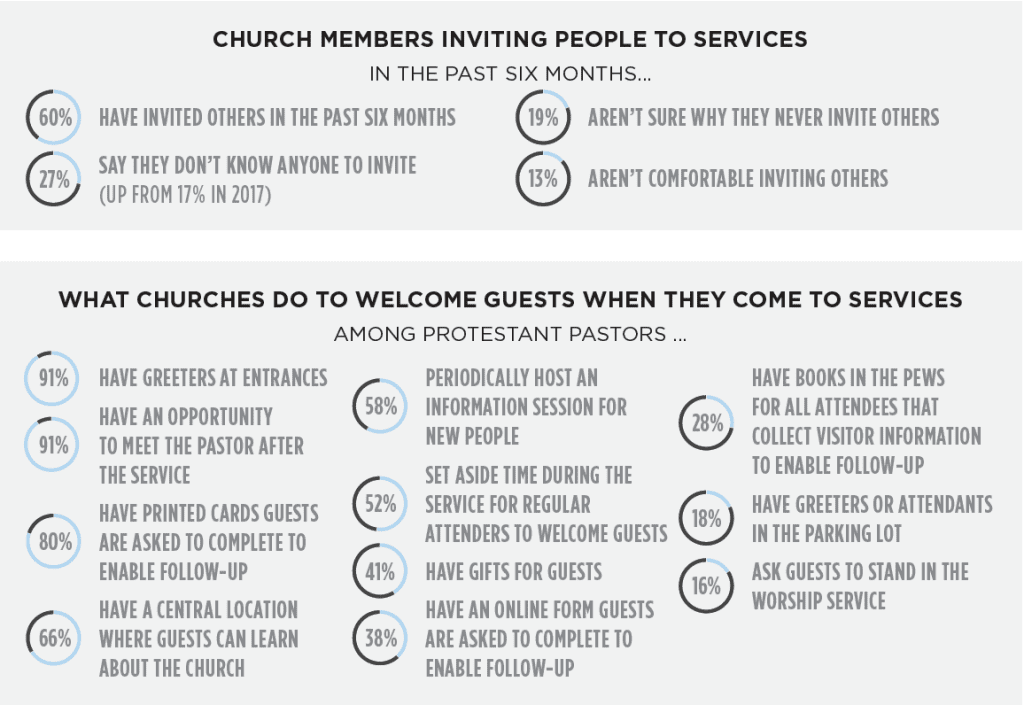A church’s outreach strategy should involve multiple efforts. But one of those efforts should include hospitality toward guests to your worship services. Some churches make visitors their primary focus for outreach, and others see it as a later step after much prior investment. Either way, looking at a recent Lifeway Research question on how churches welcome guests prompts some helpful thinking about how we can invest in guests.
Be Intentional.
Most guests don’t just appear in church. There are exceptions when the Holy Spirit moves through no action by anyone in your church. But most guests are invited.
Those who don’t typically attend church are not thinking about attending. Someone has to plant that idea. The idea is more intriguing coming from someone you know than seeing an ad or a news story.
Overall, 60% of Protestant churchgoers have invited at least one individual or family to attend a worship service at their church in the past six months. This includes 19% who invited one, 21% who invited two, and 20% who invited three or more.
In the same way guests need a nudge to think about going to church, most churchgoers need a call to invite people. Almost 1 in 5 churchgoers doesn’t know why they don’t bring guests with them to worship services more often (19%). They just aren’t thinking about it.
Ideally, our congregations would be filled with people who yearn for everyone they know to be following Christ in a local church. And our reminders should be calling people to this vision. About 1 in 14 churchgoers doesn’t think it is up to them to get people to church. They need help seeing their role. Others need to be equipped to make this part of their lifestyle—13% of churchgoers are not comfortable asking people to church.
A larger group within your church needs to move outward in their relationships. More than a quarter of churchgoers say they don’t know anyone to invite (27%), up from 17% in 2017. This can reflect a general lack of friendships, a lack of friendships outside the church, or a reluctance to invite people you don’t know well but interact with regularly. But Jesus has called us to be in the world. That means being among people with whom we can share our hope.
While guests can include believers who have been active in another church and either moved or are seeking a change, in most cases our focus should be on reaching the unreached. These include nonbelievers, new believers, and those who have been out of the church for some time.

Ask God to Bring Guests.
Even if our whole congregation were motivated and equipped to invite people, it does not mean guests will come. More than a quarter of churchgoers say the reason they don’t bring guests to worship services more often is that people refuse their invitations (26%). Increasingly in our culture, the idea of church will not naturally sound good to many people. Churchgoers describing this experience have increased from 20% in 2017 to 26% today.
Reminding our congregation of the goals helps people not to get discouraged when someone refuses an invitation. We celebrate every time a believer is obedient to the Holy Spirit’s prompting to invite others to check out what following Christ is about. We rejoice with someone extending an invitation with the gentleness and respect that Peter instructed that we exhibit every time we give a reason for our hope (1 Peter 3:15).
In a difficult culture, and as people who often struggle building relationships, we need help connecting with others in our community. We need to grow in our love for the people we meet. We need the courage to mention church and to extend an invitation. We need to regularly ask for God’s help individually and congregationally.
Optimize the Experience.
Once these guests show up, churches need to proactively take steps to ensure they have a good experience. Ninety-one percent have greeters at entrances as part of this effort, and 18% have greeters in the parking lot. While Americans don’t invest as much in the ritual of greetings as some cultures, looking someone in the eye, smiling and saying “Good morning” are the type of underappreciated assurances a new person needs. By immediately communicating, “You are welcome here,” you are answering their big question: Should I be here?
For a visitor to participate in a worship service, they have to get to the right place. When your building is complicated, you need to invest in helping people find their way to where you worship and other important locations like restrooms. Good signage can help, but don’t stop there.
A worship service is, by definition, a time for believers to worship God together. Some guests will be observing more than participating, and that is OK. If we explain why we are doing each element of worship, we are not only being helpful to guests, we also are teaching and reminding believers.
Think Like a Guest.
People checking out Christianity are not familiar with Peter’s words, “Once you were not a people, but now you are God’s people” (1 Peter 2:10), but they do understand there is a community that follows Christ. When they visit, they are exploring us as much or more than they are listening to our message.
They likely will have questions and will want to know more. How is your church ready to respond to these questions? Almost all churches provide an opportunity to meet the pastor after the service (91%). To address questions that may not pertain to the sermon, 66% of churches have a central location where guests can learn about the church. The goal is for guests to continue finding answers to the question, Is this church for me?
If the experience went well, the guest will begin to think about the future. As they consider future church visits or commitments, the church needs to be communicating. The majority of churches (58%) periodically host an information session for new people to learn more about the church and to explain more about how to get involved.
Finally, churches are wise to seek permission to thank guests for attending. You can reach out to someone only if you have a way to know they attended and can contact them afterward. So, giving a gift before they leave (41%) sends an immediate message. Obtaining contact information on a card (80%), online form (38%) or book (28%) allows you to follow up later. This last impression may be as important as the first.

